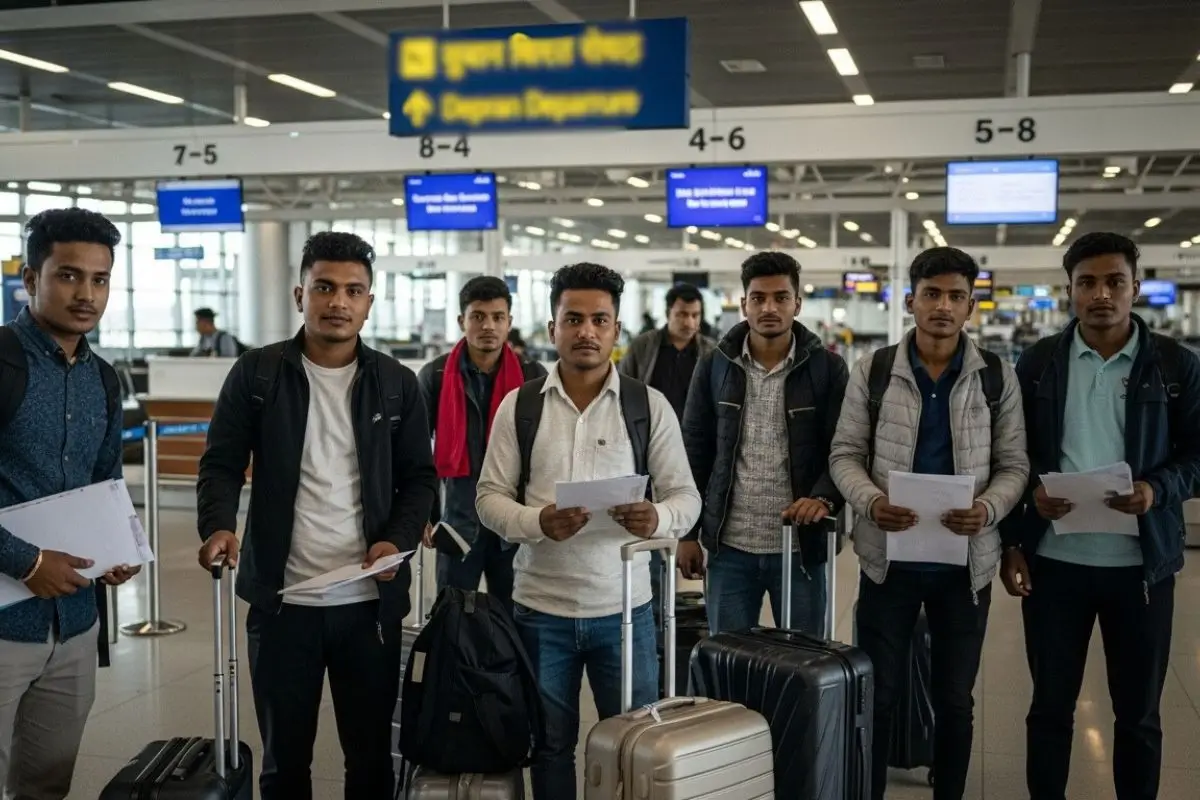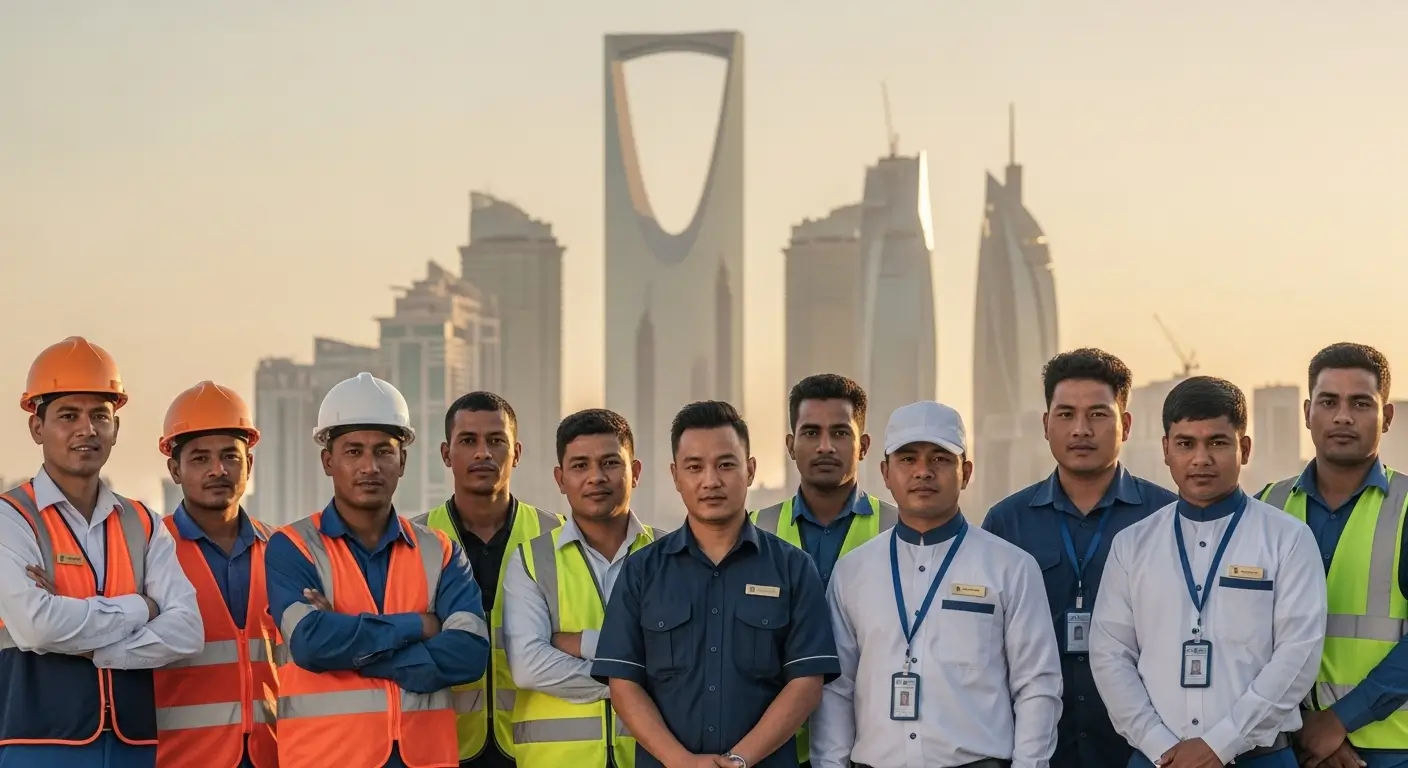
Govt. Authorized License Number 762/064/065
Our Locations
Basundhara Chowk
Kathmandu, Nepal
Email Us
info@lmmanpower.com

Jobs in Saudi Arabia for Nepali Workers provide expanding options in 2025, and you can use this authoritative overview to identify high-demand sectors, understand visa and contract updates, evaluate salary ranges, and prepare your documents and skills for roles in construction, healthcare, hospitality, logistics, and technical trades with confidence.
Jobs in Saudi Arabia for Nepali Workers are expanding rapidly in 2025 as mega-projects and tourism targets drive hiring across sectors; you’ll see strong demand from contractors working on NEOM, the Red Sea Project and new metro and airport programs, while healthcare chains and hospitality groups recruit thousands more staff. Your chances improve if you hold trade certificates, healthcare credentials, or hospitality experience, and if your recruitment agency places you on formal WPS-payroll contracts that many employers now require.
Construction remains the top recruiter, with subcontractors seeking masons, carpenters, welders and crane operators; hospitality employers hire cooks, housekeepers and front-desk staff for resort clusters; healthcare facilities recruit nurses, lab techs and attendants; logistics and port operators need drivers and warehouse hands; retail and facilities management steadily absorb domestic helpers and maintenance crews. You’ll find seasonal agricultural work and growing openings in manufacturing and cold-chain roles tied to food exports and local processing plants.
Employers prefer candidates with verified certificates, digital profiles, and English or basic Arabic skills, and you’ll notice more direct hires via online platforms and embassy-verified portals. Short-term contract roles now often include clearer salary breakdowns under the WPS, while sponsored training and probationary upskilling contracts give you a pathway from unskilled to skilled pay grades. Recruitment is shifting from informal handovers to documented e-contracts you can review before travel.
Training and certification are increasingly determinative: you should pursue TVET trade certificates, SCFHS registration for healthcare roles, or accredited hospitality diplomas to access higher-tier vacancies. Use official channels—the Department of Foreign Employment pre-departure programs and employer-registered platforms like Musaned or ministry portals—to verify job offers, check that your contract lists wages and working hours, and confirm WPS enrollment; these steps materially reduce exploitation risk and improve long-term career prospects in Saudi Arabia.
Jobs in Saudi Arabia for Nepali Workers often cluster around construction, hospitality, healthcare, logistics and domestic work; major projects such as NEOM, the Red Sea Project and Qiddiya continue to drive demand for tradespeople, hotel staff and medical support roles. You can target entry-level to skilled positions—masonry, electrical, nursing assistants, drivers and retail associates—through licensed Nepali recruitment agencies and direct-hire drives by Saudi contractors and hotel groups.
You will see steady hiring for masons, steel fixers, crane operators, formwork carpenters, electricians and site supervisors as Saudi Arabia advances airports, ports and urban projects across Riyadh and NEOM; many contractors recruit thousands of workers annually and prefer candidates with trade certificates, 2–5 years documented experience and basic English for on-site coordination.
Hotels, restaurants, retail chains and private clinics are expanding rapidly, creating openings for cooks, waitstaff, housekeepers, retail sales associates and nursing aides; major chains like Marriott, Hilton and local hospitality groups regularly run recruitment drives that you can join through agency listings or online portals.
To increase your chances you should highlight hospitality certificates, food-safety training or caregiving credentials, demonstrate conversational English or Arabic, and prepare for 1–2 year contracts with employer-provided accommodation and defined probation periods; many employers offer on-the-job training and promotion paths from junior roles to supervisory posts.
Jobs in Saudi Arabia for Nepali Workers typically offer tax-free monthly pay plus employer-provided basics; entry-level construction or general labor roles often start around SAR 1,000–1,800, skilled technicians SAR 2,500–5,000, and health or engineering posts can reach SAR 7,000–15,000 depending on certification and experience. You will commonly see wages paid monthly, with overtime and performance bonuses added; accommodation, basic food or allowances, and one-way or round-trip ticket provisions are frequently part of the contract.
Recent demand in construction, healthcare, and facilities management pushed starting wages up by several hundred riyals in 2024, especially for certified electricians, welders, and certified nursing assistants. Employers increasingly compete with signing bonuses (SAR 500–2,000) and skill premiums for Arabic- or English-speaking supervisors. You should compare offers by total compensation—base pay, allowances, and documented bonuses—rather than base salary alone.
Standard benefits include employer-paid health insurance under Saudi regulations, employer-arranged accommodation or a housing allowance (commonly SAR 600–1,500 monthly), transportation to work, and annual leave with return airfare covered at contract end or yearly, depending on the company. You will also be entitled to end-of-service gratuity calculated under Saudi labor law.
More granularly, health coverage typically follows the Cooperative Health Insurance model, giving you basic in-country treatment and emergency care; private-sector firms may upgrade plans for families at extra cost. Accommodation ranges from shared labor camps with utilities included to company flats; if housing is an allowance, factor in local rental rates (Jeddah and Riyadh are 20–40% higher than smaller cities).
End-of-service gratuity is commonly applied: employers calculate a lump sum based on your last salary and years worked, delivering a significant payout when contracts end. Verify whether your contract specifies flight frequency (annual or end-of-service), overtime rates, and any performance or production bonuses so you can compare real take-home value across offers for Jobs in Saudi Arabia for Nepali Workers.
Jobs in Saudi Arabia for Nepali Workers often proceed through licensed Nepali agencies and the Saudi MHRSD portals; you should expect employer job orders, DoFE approval in Nepal, and Saudi visa stamping before departure. Typical timelines show agency placement and contract finalization in 2–6 weeks, embassy processing adding 7–14 days, and mandatory Nepali pre-departure orientation and health checks; Saudization quotas can affect hiring in some sectors, so negotiate contract terms, salary, and accommodation clauses before signing.
You can speed placement by using a DoFE-licensed recruiter and insisting on an e-contract submitted to the Saudi MHRSD (Qiwa) for verification. Agencies that provide tracked recruitment reduce delays: a 2024 case saw a hospitality worker complete placement, visa stamping, medical, and orientation within 21 days. Keep copies of the job offer, visa page, and sponsor details to verify through the embassy and MHRSD portals if any discrepancies arise.
You will need a passport valid for at least six months, a stamped employment contract, DoFE clearance, pre-departure orientation certificate, police clearance (PCC), and a medical certificate from an approved center; professional roles require academic attestation. Employers must provide health and work-injury insurance and arrange visa sponsorship (iqama) after arrival, so confirm these items are listed in your contract.
For academic attestation follow the sequence: issuing university verification, Nepal Ministry of Education stamp, Nepal Ministry of Foreign Affairs (MOFA) attestation, then Saudi embassy legalization; obtain PCC from Nepal Police (typically valid six months) and a medical exam covering chest X-ray, HIV, and hepatitis tests at IOM- or DoFE-approved labs. Keep original documents plus scanned copies, note embassy processing fees and timelines, and understand that missing or forged papers can lead to fines, visa denial, or deportation. Jobs in Saudi Arabia for Nepali Workers demand strict paperwork — prepare and verify each step to avoid costly delays.
Employers filling Jobs in Saudi Arabia for Nepali Workers prioritize verified credentials, attested education/experience documents, and medical fitness; you should present attested diplomas, a police clearance, and a clean medical report. Many employers expect 2–5 years of relevant experience for skilled roles, basic technical diplomas for trades, and documented on-the-job training for supervisors. You will often need employer-specific certifications or licenses attested by Nepalese authorities and the Saudi embassy before processing your visa and contract.
Construction jobs typically ask for a trade certificate, heavy-equipment license, and 2–4 years’ field experience; oil-and-gas contractors (e.g., Aramco suppliers) demand safety cards, drug screening, and contractor-specific courses. Healthcare positions require a nursing diploma or degree plus Saudi Commission for Health Specialties (SCFHS) registration and Prometric exam passage. Hospitality roles favor hospitality diplomas, food-safety certificates, and conversational English; domestic workers usually need agency training, ID verification, and biometric registration.
Basic conversational English (CEFR A2–B1) often suffices for many entry-level Jobs in Saudi Arabia for Nepali Workers, while supervisory and technical roles commonly ask for B2 or higher and measurable TOEIC/IELTS scores (e.g., TOEIC ~400–600 or IELTS 4.0–6.0). Employers sometimes request foundational Arabic phrases for guest-facing or household roles. You should be prepared for employer-led on-the-job language briefings and industry-specific English courses before deployment.
Practical upskilling pathways include short, focused courses: 8–12 week English programs can move you from A2 toward B1, and targeted workplace-English modules (medical English, hospitality English) accelerate role readiness. Government-mandated pre-departure orientation training and agency-run safety courses cover workplace rights, basic Arabic greetings, and sector safety, completion is often required for visa issuance.
Consider NEBOSH for safety roles, SCFHS Prometric prep for healthcare, and recorded employer case studies showing candidates who completed 6–10 weeks of language plus technical training secured higher-paying contracts; investing in these measurable credentials increases your competitiveness for Jobs in Saudi Arabia for Nepali Workers.
You working within Jobs in Saudi Arabia for Nepali Workers face specific hurdles: Arabic-language contracts and occasional wage delays, with summer temperatures often reaching 45–50°C that raise health risks on outdoor sites. You may encounter withheld travel documents or unclear recruitment fees — many cases trace back to informal agreements in Nepal prior to departure. Understanding contract terms, keeping copies, and using bank transfers under the Wage Protection System cuts exposure; still, thousands of Nepali workers navigate disputes annually, so proactive documentation and embassy contacts are crucial.
You will adapt to strict dress codes, gender-segregated spaces, and five daily prayer pauses that can alter your work rhythm; Ramadan brings shorter daytime hours and different meal schedules. Learning 20–30 practical Arabic phrases, joining Nepali expat groups in Riyadh, Jeddah or Dammam, and respecting local customs like public modesty and the alcohol ban smooth daily life. On-site, English often suffices in multinational construction teams, but basic Arabic improves negotiation and safety communication.
You can use multiple support routes: file wage complaints through the Saudi Wage Protection System (WPS) and HRSD e-services, contact the Nepali Embassy in Riyadh or consulates in Jeddah/Dammam for legal aid, or reach local NGOs that assist migrants. Keep your employment contract, payslips, and bank statements; these documents speed investigations. Many complaints end in mediation within weeks, though complex cases may go to labor courts.
Document everything: timestamp offers, copies of recruitment receipts, and WhatsApp messages about salary or overtime, and register complaints online via HRSD/Qiwa using your iqama number. Expect initial mediation meetings within 2–6 weeks; prepare a clear timeline and bank records to prove nonpayment. If the employer ignores orders, the embassy can escalate to repatriation support or legal representation; using WPS and embassy advocacy together gives you the strongest chance to recover unpaid wages or obtain emergency travel home.
To wrap up, Jobs in Saudi Arabia for Nepali Workers offer expanding opportunities in 2025, and you should focus your efforts on verified employers, updated skills, and clear contracts to protect your rights and income; prepare proper documentation, secure legal recruitment channels, and negotiate fair terms so your move is safe and productive while maximizing earnings and career growth in sectors like construction, healthcare, and domestic services.
Sudarshan Sapkota is a distinguished human resource expert and a renowned specialist in abroad job recruitment. With over two decades of experience in the HR industry, Sudarshan has become a leading figure in connecting talent with opportunities across the globe from Nepal. His expertise spans a wide array of sectors, ensuring that both employers and job seekers receive the best possible match for their needs.